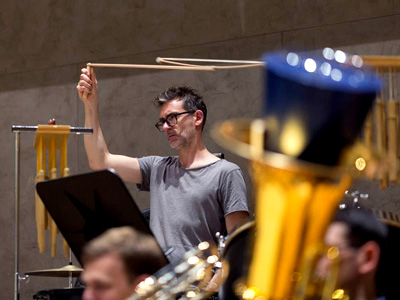
By ANDREW POWELL
Published: July 29, 2017
MUNICH — Not every week does the Bavarian Radio Symphony Orchestra devote a whole program to music written since 2000. Guest conductor Matthias Pintscher’s concert July 7 in the Herkulessaal proved an exception. It began spatially, extravagantly, with his own fantasy With Lilies White (2002); progressed to a nuanced new Mark Andre work in need of an edit; and concluded, feebly it must be said, with pieces by György Kurtág and Jonathan Harvey. Along the way, the orchestra’s precision, enthusiasm, and seemingly instinctive care with color and balances brought rewards. The 20-minute fantasy, written for Cleveland and scored for orchestra with voices, sets wholly unrelated texts by Edward Paston and Derek Jarman, makes chitchat in soft percussive would-be quadrophony, and fuses stylistic gestures of the Renaissance and Baroque. If it never quite makes its point, it at least achieves handsome self-sufficiency. Vinzenz Löffel, soloist of the Augsburger Domsingknaben, and sopranos Sarah Aristidou, Anna-Maria Palii and Sheva Tehoval etched the vocal lines with varying degrees of steadiness at probably too much volume. The longer, BRSO-commissioned whence … whither (2016) charts the touch and direction of a barely audible wind, an element of Christian faith for Andre, né Marc André. Strings and percussion of a large orchestra used with remarkable restraint trace sound-shadows that are broken up by abrupt or gradual, hard or soft, events to yield an intriguing sense of physical movement, crucially free of horror-movie cliché. Even the whirling bows, or Schwirrbögen, fit in snugly. The first four of Andre’s seven movements, called “sections,” present a balance of ideas and might well have made a complete work — the third rises loudly, as it were violently, at its close; the fourth hints at resolution — but the composer pushes on, stirred by the spiritual number seven, alas with duller material until a lively yet in context less innovative final section. Kurtág conveys nothing so much as desolation in his seven-minute Petite musique solennelle (2015), a harmonically cautious exercise in sour chord-clusters. Clangor at the midpoint comprises one statement of a permeating four-note figure. Brooding horns, soft trumpet lines of some grace, and reticent percussive utterances go precisely nowhere. Harvey’s … towards a Pure Land (2005) places a string group “peacefully behind the sound” of the main orchestra, endowed with innumerable percussion instruments, and proceeds to describe in sixteen minutes an active but chronically pallid arc whose center of “insubstantial pitch” is, as in the Kurtág, and in the composer’s words, “an emptiness.” There, presumably, lies the Pure Land, “a state of mind beyond suffering … revealing the meaning of Dharma,” not in the surrounding music, with its fluid, ungraspable ideas. Pintscher and BR’s players nimbly negotiated all exercises.
Photo © Bayerischer Rundfunk
Related posts:
Time for Schwetzingen
Bieito Hijacks Boris
Thielemann’s Rosenkavalier
Zimerman Plays Munich
Stravinsky On Autopilot